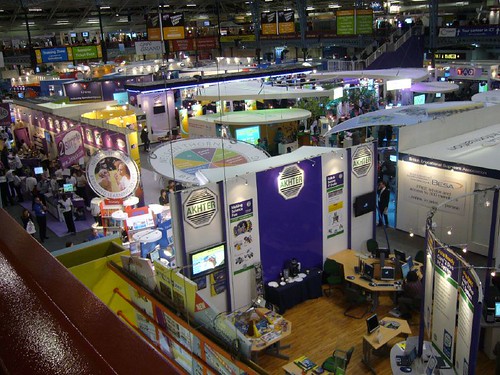Here are 16 suggestions for getting the most out of the experience.
Wear shoes with cushioned soles: the floor is concrete and therefore very tiring to walk on for a whole day.
Put your phone on vibrate if you can: in my experience, you can't hear your phone ringing above the noise.
As soon as you have passed through the entrance, find somewhere to sit, and look through the bag you will have been given. Get rid of any unwanted paper, and then look to see if there are any last-minute exhibitor entries, in case there are one or two that you ought to visit. Then get your bearings.
Aim to visit the most important exhibitors on your list first, in case you get waylaid or get too tired to continue.
If you attend BETT on the Wednesday, ie on the first day of the show, it may be worth finding the Department for Children, Schools and Families ( DCSF) stand soon after the opening of the show. As a rule, the show is officially opened by a Government minister, who may announce new funding or a new development.The DCSF stand may have an area where you can listen to the announcement live (the hall in which the announcement is made is usually difficult to get into without an official invitation).
Do not collect loads of information: it weighs a ton after a while. That’s where your business cards come in: give them to exhibitors you are interested in, and ask them to send you stuff after the show.
Don’t collect loads of information on behalf of other teachers. I did that for years and as far as I know not one person did anything different as a result. In fact, it was probably counter-productive because it conveys the impression that you are just a glorified mailman.
If you get thirsty, look out for free water which may be provided by some stands.
When you strike up a conversation with someone, or meet up with colleagues, always ask: what have you see today that has excited you? And then follow up on their suggestions.
At some point in the day, forget your careful planning and wander around. You will be surprised at what you come across that hasn’t been listed in any brochure. For example, good prices on some items, new publications, and companies you have never heard of.
Head on over to the Times Education Supplement stand, to pick up a free copy of the periodical.
Pick up free copies of other educational technology magazines – but bear in mind that some are little more than collections of advertisements.
As well as the usual sorts of freebies like mugs and sets of pens, mouse mats and notepads, there are often more useful ones. For example, one year the QDCA was giving away miniature versions of the ICT Programme of Study, which you could keep on you for quick reference. Some stands may have useful documentation on data sticks.
If you are staying to the bitter end, and you have deposited a coat in the cloakroom, collect it about an hour before the end of the show, to avoid a long wait. That means around 5pm Wednesday to Friday, and 3pm on the Saturday.
The next two points are especially relevant if you are attending for more than one day, or have team members attending on different days to yourself.
Find out what others thought about products and events seen at the show. Use the tag #BETT2010 in Twitter and BETT2010 in Technorati and elsewhere. (Not sure what a tag is? See this article.)
Check the ICT in Education website for news and reviews about the show.



